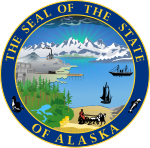| |||||||||||||||||||||||||||||||||||||
| |||||||||||||||||||||||||||||||||||||
Murkowski: 20–30% 30–40% 40–50% 50–60% 60–70% 70–80% Miller: 30–40% 40–50% 50–60% 60–70% Stock: 30–40% 40–50% 50–60% 60–70% 70–80% Metcalfe: 20–30% 30–40% Tie%/No Votes: 20–30% 30–40% 40–50% N/A | |||||||||||||||||||||||||||||||||||||
| |||||||||||||||||||||||||||||||||||||
| Elections in Alaska |
|---|
 |
The 2016 United States Senate election in Alaska was held on November 8, 2016, to elect a member of the United States Senate to represent the State of Alaska, concurrently with the 2016 U.S. presidential election, as well as other elections to the United States Senate in other states and elections to the United States House of Representatives and various state and local elections.
Incumbent Republican Senator Lisa Murkowski won re-election to a third term in office.[1] The primaries were held on August 16.[2] She was challenged by several candidates, including Democrat Ray Metcalfe, a former Republican state legislator; Independent Margaret Stock, an attorney; and Libertarian Joe Miller, who had defeated Murkowski for the Republican nomination six years before.[3]
Murkowski was re-elected with 44.4% of the vote, becoming the first person in history to win three elections to the U.S. Senate with pluralities but not majorities, having taken 48.6% in 2004 and 39.5% in 2010.[4] Miller's 29.2% finish was then the best ever for a Libertarian candidate in a U.S. Senate election in terms of vote percentage.[a] This record was surpassed four years later by Ricky Dale Harrington Jr., who received 33.4% of the vote in the 2020 Arkansas Senate election, which had no Democratic candidate. This was also the first U.S. Senate election where four candidates received more than 10% of the vote since the 1942 Minnesota race, as well as being the first Senate race since then where the Democratic nominee finished fourth.
- ^ Erica Martinson (March 6, 2016). "Murkowski mines energy industry for major campaign funds". Alaska Dispatch News. Retrieved March 8, 2016.
Murkowski's main challenger, Stock, is running as an independent
- ^ "Lisa Murkowski announces that she's running in 2016". AmandaCoyne.com. October 19, 2013. Archived from the original on October 25, 2014. Retrieved October 25, 2014.
- ^ Cite error: The named reference
Joe Miller to challenge Murkowskiwas invoked but never defined (see the help page). - ^ "Murkowski Could Become 1st US Senator with Three Plurality Victories". Smart Politics. October 11, 2016. Retrieved November 12, 2016.
- ^ "New Mexico Election Results". The New York Times. November 6, 2018. Retrieved November 9, 2018.
Cite error: There are <ref group=lower-alpha> tags or {{efn}} templates on this page, but the references will not show without a {{reflist|group=lower-alpha}} template or {{notelist}} template (see the help page).







